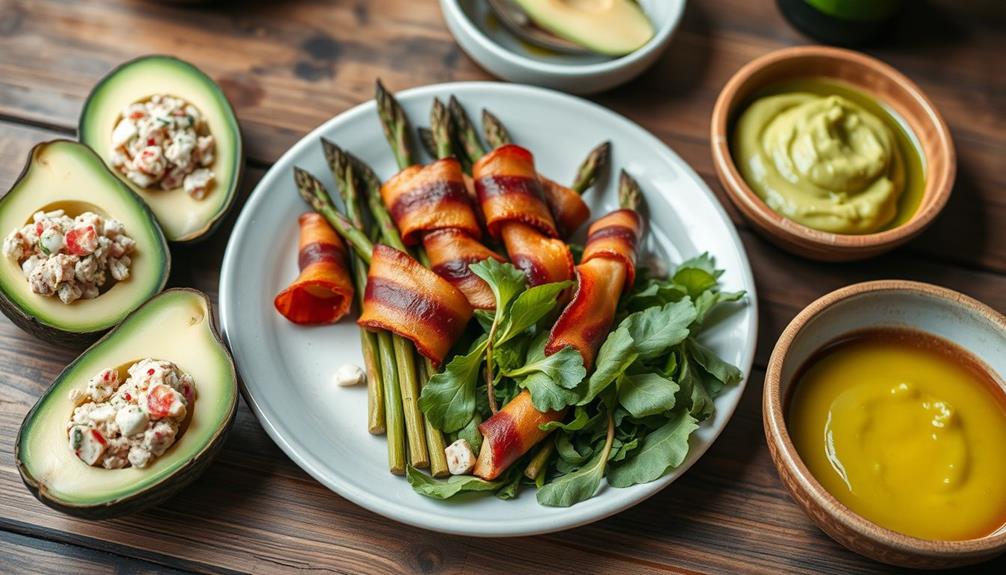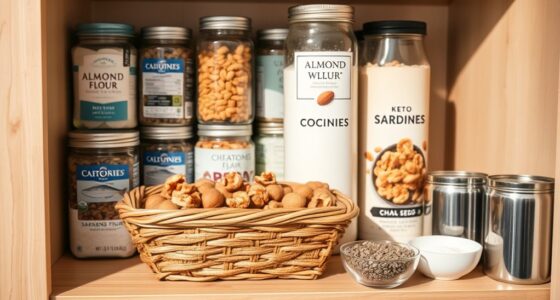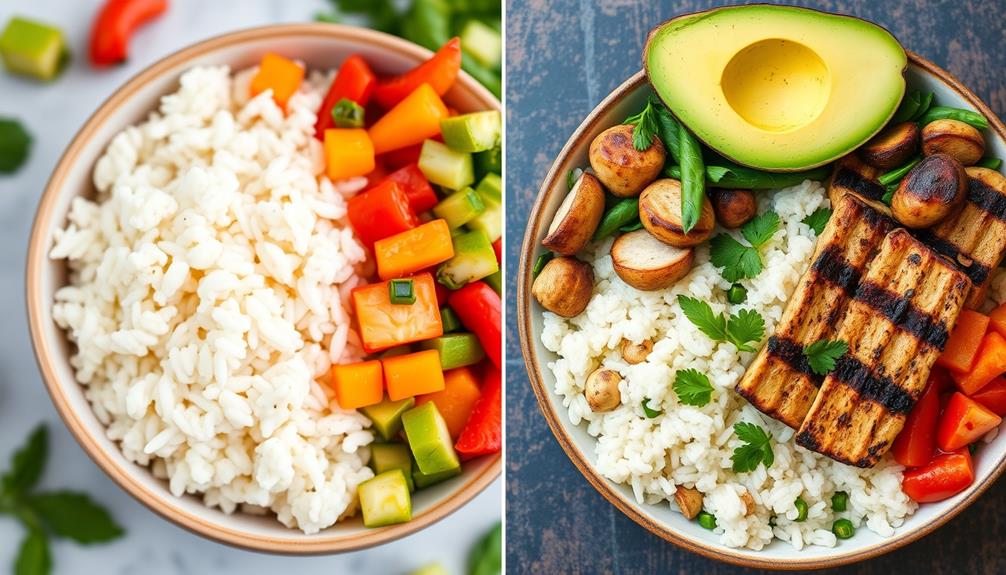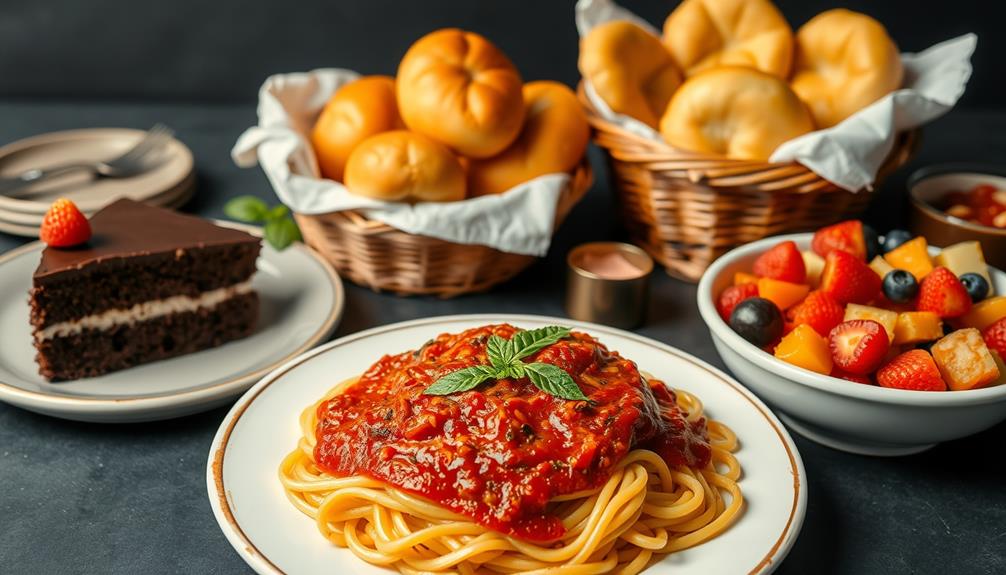On a keto diet, you'll want to eat foods that are low in carbs and high in healthy fats. Focus on fatty fish like salmon and sardines, along with fresh meats such as beef, chicken, and pork. Incorporate non-starchy vegetables like spinach, broccoli, and cauliflower for essential nutrients. Don't forget full-fat dairy options, like cheese and Greek yogurt, along with eggs. Healthy fats from olive oil, avocado oil, and butter are also important. For snacks, almonds and dark chocolate can satisfy cravings without ruining your ketosis. There's so much more to explore to keep your meals exciting and nutritious! To keep things interesting, you can also experiment with various herbs and spices to add flavor without extra carbs. Some of the **best keto-approved foods** include avocados, which provide both healthy fats and fiber, as well as nuts like macadamias that are low in carbs but rich in taste. By diversifying your meals with these options, you’ll stay satisfied while maintaining your keto lifestyle.
Key Takeaways
- Focus on fatty fish like salmon and mackerel for omega-3s and protein without carbs.
- Incorporate fresh cuts of meat and poultry, which are high in protein and carb-free.
- Choose non-starchy vegetables like spinach and broccoli, which provide essential nutrients with low carb counts.
- Include full-fat dairy products and eggs for low-carb, protein-rich options in your meals.
- Snack on nuts, seeds, and low-carb veggies paired with high-fat dips for satisfying and nutritious treats.
Essential Keto Foods
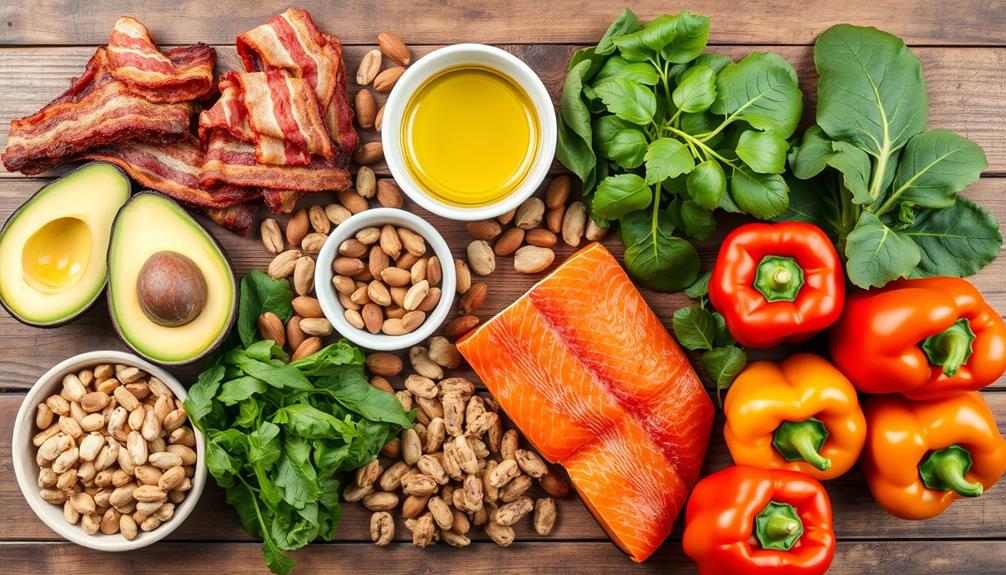
When diving into the keto diet, you'll want to stock up on essential keto foods that keep your carb intake low while fueling your body. Start with seafood, as fatty fish like salmon and sardines are perfect choices, offering omega-3 fatty acids with zero carbs per serving. These not only support heart health but also boost cognitive function.
Additionally, incorporating natural remedies can enhance your overall wellness while on the keto diet.
Next, focus on meat and poultry. Fresh cuts of beef, pork, chicken, and turkey are all carb-free and packed with protein. For instance, ground beef provides about 21.8 grams of protein per 3-ounce serving, making it a hearty option.
Don't forget non-starchy vegetables like spinach, broccoli, and cauliflower. These veggies are low in carbs—less than 8 grams of net carbs per cup—while brimming with essential vitamins and minerals, which are crucial for your balanced keto diet.
Incorporate dairy and eggs into your meals, too. Full-fat dairy products, such as cheddar cheese and Greek yogurt, are low in carbs, while eggs have less than 1 gram each.
Animal Proteins
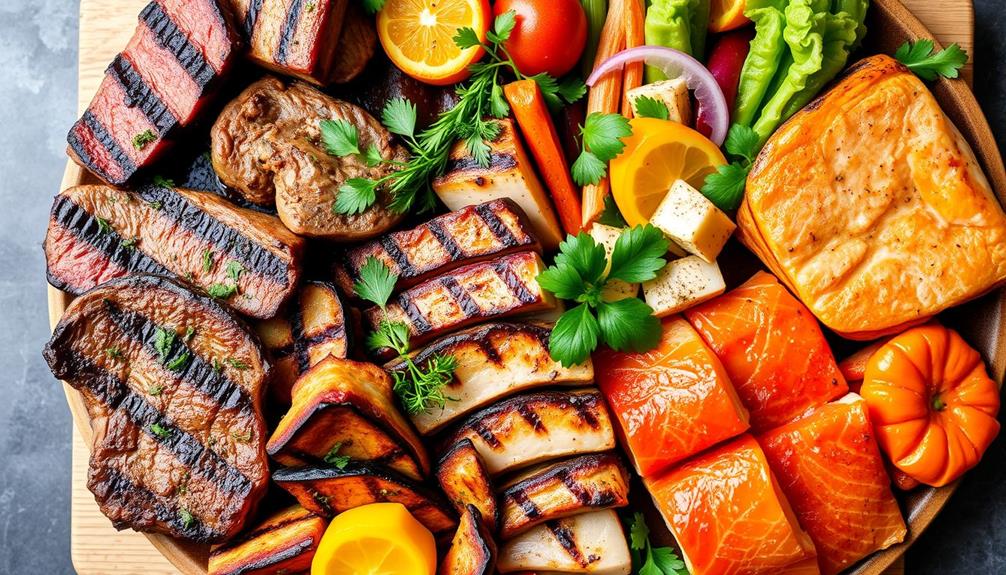
Animal proteins play an essential role in your ketogenic diet by providing high-quality protein without the added carbs. They're vital for maintaining muscle mass while you enjoy the benefits of a low-carb lifestyle.
Additionally, incorporating a variety of animal proteins can enhance your overall health, support satiety, and guarantee you're getting essential nutrients. For example, fatty fish like salmon are rich in omega-3 fatty acids, which can support heart health and reduce inflammation beneficial for overall health.
Here are some great options to take into account:
- Fatty fish: Rich in omega-3 fatty acids, salmon and mackerel are fantastic choices. Aim for 8-10 ounces per week.
- Fresh meat: Grass-fed beef and poultry are excellent sources of high-quality protein and can boost HDL cholesterol levels.
- Eggs: With less than 1 gram of carbs per egg, they're nutrient-dense and versatile, perfect for any meal.
- Pork: Cuts like bacon or tenderloin add flavor and protein while keeping you in ketosis.
- Shellfish: Shrimp and crab provide protein and essential minerals with minimal carbs.
Low-Carb Vegetables
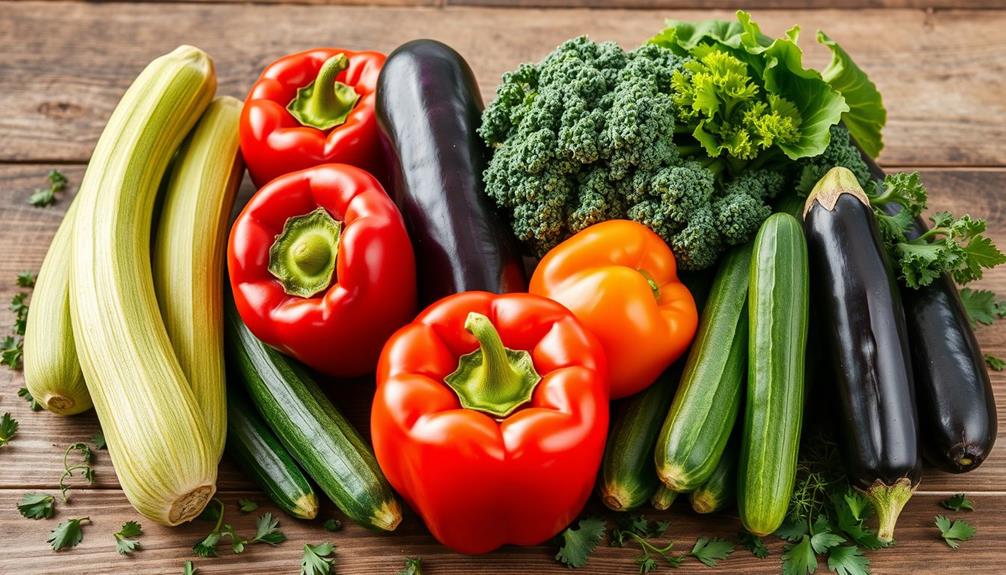
Embracing the vibrant world of low-carb vegetables can greatly enhance your ketogenic diet. Non-starchy vegetables are essential, as they typically contain less than 8 grams of net carbs per cup, making them low-calorie and nutrient-dense options. Incorporating a variety of these vegetables also aligns with a budget plan for managing expenses, allowing you to enjoy healthy meals without overspending.
Broccoli, cauliflower, zucchini, and spinach are excellent choices, loaded with vitamins, minerals, and antioxidants that support overall health. Dark leafy greens, such as kale and Swiss chard, stand out for their high nutrient content while remaining extremely low in carbohydrates.
Incorporating a variety of these vegetables, including bell peppers and asparagus, can add color and flavor to your meals without greatly increasing carb intake. Adding non-starchy vegetables not only helps maintain a balanced diet but also contributes to feelings of fullness, making it easier to stick to your keto goals.
Plus, the dietary fiber found in these veggies supports digestive health, ensuring your body functions at its best. So, when planning your meals, prioritize low-carb vegetables to maximize your nutrient intake while keeping your carbohydrate count in check.
Enjoy the benefits of a colorful plate packed with essential nutrients that truly complement your keto lifestyle!
Healthy Fats and Oils
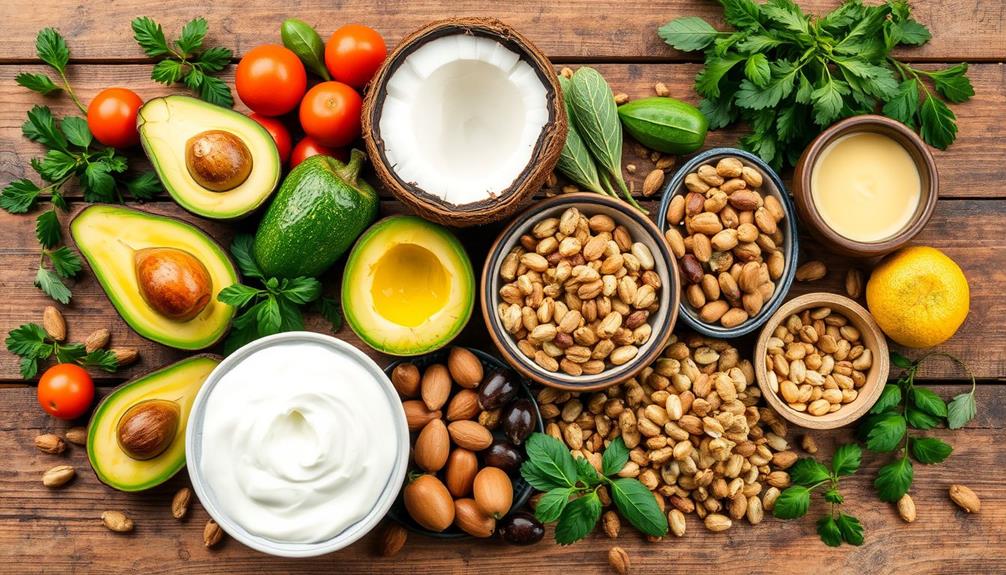
Incorporating healthy fats and oils is essential for optimizing your ketogenic diet. These fats serve as your primary energy source, keeping your body in a state of ketosis. A balanced diet rich in healthy fats can also support overall health and longevity, making it easier to maintain weight loss goals.
Here are some excellent options to include:
- Olive Oil: Rich in monounsaturated fats, it offers about 14 grams of fat per tablespoon and zero carbs.
- Avocado Oil: Similar to olive oil, it provides healthy fats and is perfect for cooking or salad dressings.
- Coconut Oil: Contains medium-chain triglycerides (MCTs) that can boost ketone production, offering around 14 grams of fat per tablespoon.
- Grass-Fed Butter: With approximately 12 grams of fat per tablespoon, it also contains nutrients like vitamin K2 and butyrate, which support gut health.
- Ghee: This clarified butter has a high smoke point and provides about 14 grams of fat per tablespoon, making it ideal for high-heat cooking.
Incorporating nuts and seeds into your diet can also provide beneficial monounsaturated fats, supporting heart health.
These healthy fats not only enhance flavor but also help maintain your energy levels throughout the day. For more insights on effective strategies for weight loss, consider how these fats fit into your broader dietary goals.
Snacks and Desserts
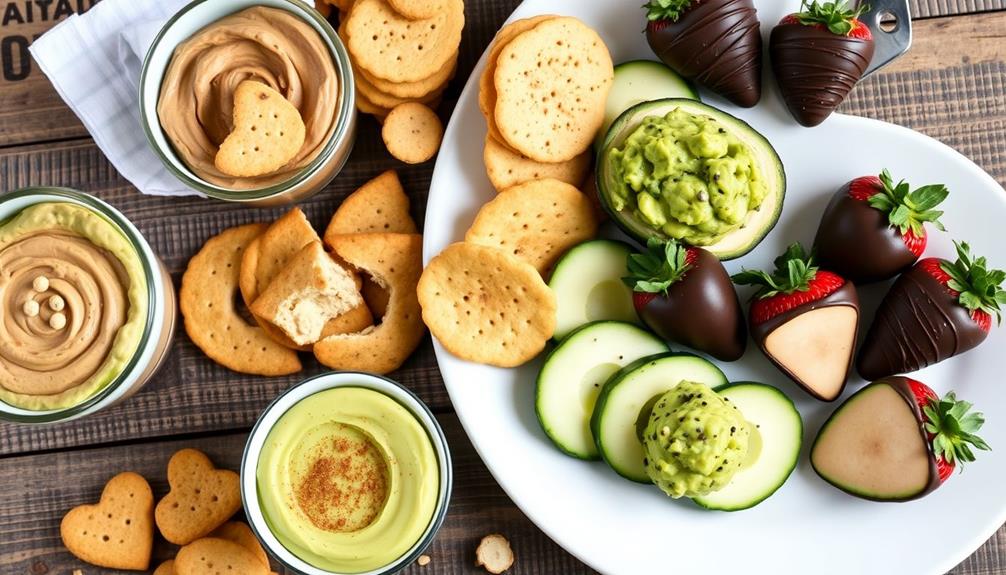
Snacking on keto-friendly foods can be both satisfying and nutritious, helping you stay on track with your dietary goals. Incorporating nuts and seeds like almonds and chia seeds into your routine provides healthy fats and protein while keeping carbs low—just 6 grams of carbs and 3.5 grams of fiber in a 1-ounce serving of almonds.
Additionally, consider using essential oils such as tea tree oil for their antimicrobial properties, which can support overall health while you maintain your diet.
Cheese is another great option; varieties like cheddar and mozzarella offer about 1 gram of carbs per ounce, making them perfect for curbing hunger. You can't go wrong with hard-boiled eggs, either. With less than 1 gram of carbs each, they're a protein-packed snack that promotes fullness.
If you're craving something sweet, enjoy some dark chocolate (70% cocoa or higher) in moderation. It contains around 13 grams of carbs per ounce and satisfies sweet cravings while providing antioxidants.
Lastly, pair low-carb veggies like celery, cucumber, or bell peppers with high-fat dips such as guacamole or cream cheese for a versatile and nutritious snack.
These options will keep you energized and aligned with your keto diet while enjoying tasty snacks throughout the day.
Frequently Asked Questions
What Foods Can You Eat on a Keto Diet?
You can enjoy a variety of foods, including fatty fish like salmon, eggs, non-starchy vegetables, high-fat dairy, and healthy fats such as olive oil. These options keep your meals delicious and satisfying while staying low in carbs.
What Food Is Not Allowed in Keto?
You shouldn't eat high-carb foods like bread, pasta, and sugary treats. Starchy vegetables and high-sugar fruits are off-limits too. Avoid processed snacks, as they can derail your efforts to maintain ketosis effectively.
What Are the 9 Rules of Keto?
When diving into keto, you'll want to embrace a few friendly guidelines. Limit carbs, savor healthy fats, enjoy moderate protein, stay hydrated, and focus on whole foods for a delightful journey to wellness.
What Is the Trick to Keto Diet?
The trick to the keto diet is cutting carbs greatly while boosting fats. This shift forces your body into ketosis, where it burns fat for energy. Staying hydrated and tracking your intake is essential for success.
Conclusion
In the world of keto, you're not just on a diet; you're starting a culinary adventure akin to Odysseus steering through treacherous waters. By choosing nutrient-dense animal proteins, vibrant low-carb veggies, and healthy fats, you'll transform your meals into feasts fit for a hero. Embrace delicious snacks and desserts that keep your cravings at bay, and soon, you'll find yourself thriving in the land of ketosis, ready to conquer any challenge that comes your way!
